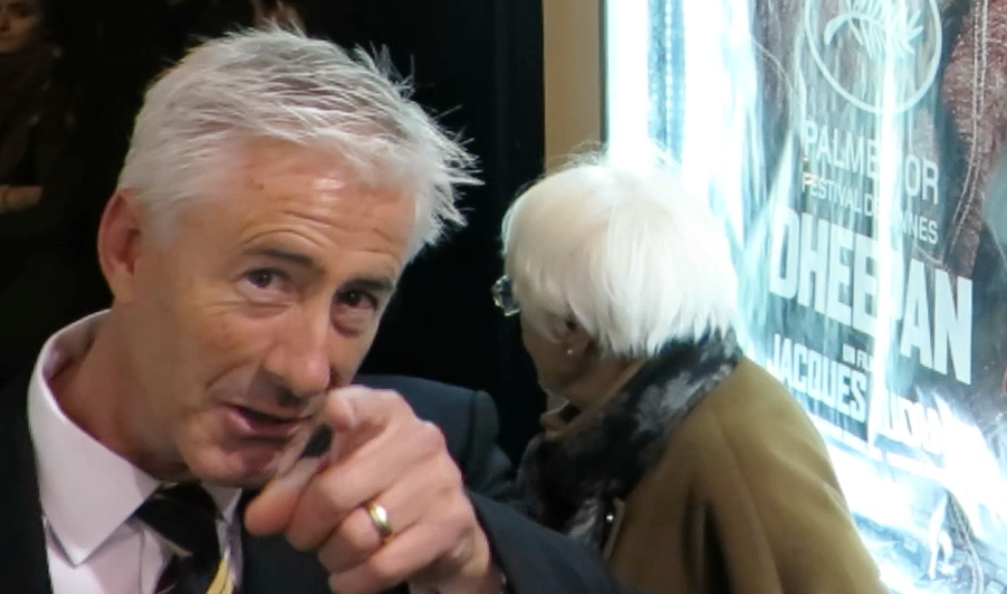There are two things that have happened only once in my 20 years of interviewing people as a journalist and while neither were traumatic, they were both odd.
Only once has someone turned and fled to avoid answering my questions.
Only once have I ever resorted to just shouting questions at someone when a polite conversation would have made life much easier.
What makes these two moments memorable, though, was that they both happened on the same night in Paris, and they both involved the same person — Christopher Horner.
Horner is a lawyer who has just been picked by President-elect Donald Trump to be part of the team preparing the U.S. Environmental Protection Agency (EPA) for his administration.
Now, Horner’s not usually shy about publicity. He gives plenty of interviews to conservative newspapers and television networks and has written several books and columns.
Horner’s Hustle
But on December 7, 2015 at the “premiere” of a climate science denial film, Climate Hustle, Horner did everything he could to avoid talking to me about the cash he’d been getting from coal companies.
It was a bizarre experience, but first a bit of background.
Horner is known for targeting climate scientists and government environmental administrators, including those at the EPA, with requests for years’ of their email records. He says it’s due diligence. Others say it’s harassment.
Horner also denies the science linking the production of greenhouse gases from burning fossil fuels like coal and oil to dangerous climate change. He writes columns and books about that.
He’s affiliated with several of the conservative think tanks that are part of the web of conservative groups pushing climate science denial, sometimes with the financial backing of the fossil fuel industry and rich conservatives, including the Koch brothers.
He also works with David Schnare, another member of Trump’s EPA “landing team” and another lawyer accused of harassing climate scientists and government administrators with waves of legal requests.
Horner’s Coal Cash
Back to that night in Paris in December 2015, where on the other side of the city, negotiators were busy building a historic global agreement to cut greenhouse gas emissions.
Horner was at the premiere of the climate science denial documentary Climate Hustle, produced by another thread in that climate denial web — the Committee for a Constructive Tomorrow.
A few months earlier, The Intercept had revealed that Horner and one of the legal groups he worked for, Schnare’s Energy & Environment Legal Institute (E&E Legal), was being paid by a coal company called Alpha Resources.
Outside the cinema, Horner had at first seemed friendly, waving at the camera being held by DeSmog editor Brendan DeMelle. So I made my way over to ask him about that coal cash. Notebook in hand, I approached.
“Hi, Mr Horner…,” I say. “Just a moment,” replies Horner.
I stand for a few seconds, before Horner makes a gesture off to the distance, turns, and walks quickly away behind a white van. A little bemused, I follow, calling his name, but by the time I get to the back of the van he’s gone. Like the Scarlet Pimpernel.
I thought my chance had gone, but 15 minutes later Horner turns up in the queue to get in to the film, hidden behind some of the other attendees.
So I approach again, up the cinema steps, and call his name. I try saying, “Chris,” “Mr. Horner,” and “Christopher Horner,” but he blanks me entirely.
I’m just six feet away, but he won’t even politely decline.
But a helpful lady sees I’m trying to attract his attention and taps Horner on the arm, pointing at me. Horner smiles, but still won’t look at me.
It’s all a bit awkward. Horner is cornered. He can’t go anywhere, he has a reporter trying to speak to him, a lady trying to be helpful, and he is trying to pretend nothing is happening.
Then another gentleman also taps Horner on the arm, explaining I’m trying to ask him a question. Another smile, another awkward moment. But still Horner won’t engage.
A security guard asks me to step down from the steps. I try shouting a question, but know now there’s probably little point.
“Mr. Horner, I wanted to ask you about your work for coal companies. I wanted to ask if you were still doing that work.”
And that was it. Horner finally slips inside, safe among friends and away from difficult questions about his funding sources.
Watch the episode here:
Coal Conflicts
With hindsight, it’s no wonder Horner didn’t want to talk about that funding from Alpha Natural Resources.
A few months later, it emerged that E&E Legal, which Horner works for, had also taken money from another firm, Arch Coal. Shortly after that, another giant coal firm, Peabody Energy, filed for bankruptcy. That company, too, had a financial relationship with E&E Legal and also the Free Market Environmental Law Clinic (FMELC). David Schnare is the director at FMELC and Horner the senior clinical attorney.
It was starting to look as though Chris Horner’s work was riddled with potential conflicts of interest — none of which he had ever bothered to disclose while being interviewed as a pundit, while writing his columns, while authoring his books or while filing all those Freedom of Information Act (FOIA) requests for the emails of climate scientists and EPA administrators.
The way Horner behaved that day was a handy metaphor for the way many climate science deniers approach the issue of climate change — ignore or run away from things that don’t fit into your argument (like melting ice sheets or the tumbling of heat records), never talk about where your money comes from, and don’t expose yourself to scrutiny.
Because that could all get very awkward.
Main image credit: DeSmog
Subscribe to our newsletter
Stay up to date with DeSmog news and alerts






